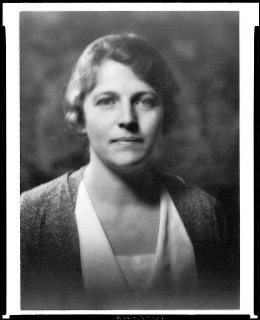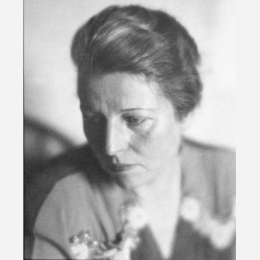Pearl S. Buck
| Name | Pearl S. Buck |
|---|---|
| Born | June 26 1892 |
| Died | March 6 1973 |
| Birth Location | West Virginia |
Writer and social activist who was an outspoken wartime advocate for Japanese Americans.
Born in West Virginia and raised in China, the daughter of Southern Presbyterian missionaries, Pearl Comfort Sydenstricker (1892–1973) attended Randolph-Macon Women's College before returning to China, where she married a missionary, John Lossing Buck. During the early 1920s, she and her husband lived in Nanjing (with one year in Umzen, Japan), where she taught at Nanking University and cared for a mentally disabled daughter, Carol. After receiving an MA degree at Cornell University, Buck returned to China, where she started writing stories and essays. She soon attracted widespread attention for a series of popular novels with Chinese themes. Buck's second novel, The Good Earth (1931), the story of a peasant family, became an international bestseller and won the Pulitzer Prize, then was adapted into a popular Hollywood film.
In 1933 Buck, who had separated from her husband, returned to the United States, obtained a second MA degree at Yale University, then settled in Bucks County, Pennsylvania. In the years that followed, she married her publishing agent, Richard Walsh. She and Walsh assumed direction of Asia magazine. In 1938, Buck was awarded the Nobel Prize for Literature, the first American woman so honored. Other popular novels such as China Sky (1941) and Dragon Seed (1942) followed, as did a collection of feminist essays, Of Men and Women (1941).
Buck worked extensively in the years before World War II as a civil rights activist, with such groups as the American Civil Liberties Union and the National Urban League. She became a public supporter of China's struggle against Japanese occupation and raised money for Chinese war relief. In 1941, she and Walsh formed the East-West Society to encourage Asian/American dialogue. During these years, Buck had little exposure to Japanese Americans. However, in 1940 she met pro-Chinese Issei writer Haru Matsui (Ayako Ishigaki), whose book Restless Wave she had reviewed positively. The two women became friends, and Buck encouraged Ishigaki to contribute to Asia . Following the Japanese raid on Pearl Harbor, Buck wrote Ishigaki an unsolicited letter endorsing her loyalty and offering aid in case of trouble.
As the United States became embroiled in war with Japan in 1941-42, Buck warned in speeches, letters, and articles that victory could not be achieved without the collaboration of Asian peoples, and that undemocratic treatment for racial minorities at home, especially Asian Americans, imperiled such alliances. In the process, Buck became virtually the only nationally known figure to oppose mass removal of Japanese Americans during Spring 1942. Buck forwarded letters opposing removal from West Coast friends to government officials, notably Eleanor Roosevelt , and scheduled meetings of the American Civil Liberties Union's civil rights committee to discuss assistance. Buck meanwhile joined the advisory board of the Japanese American Committee for Democracy (JACD), a New York based anti-fascist civil rights organization. At a JACD victory meeting in April 1942, Buck spoke out in favor of the loyalty of Japanese Americans and declared that rather than excluding them, the U.S. government should welcome their participation in the war and train them to help build democracy in postwar Japan. She repeated the proposal in her book American Unity and Asia , calling on Japanese Americans to recognize that there were fair-minded people who supported them and to not be swayed in their loyalty by insults or mistreatment. "I beg you, Japanese Americans, that you will not despair of democracy in America." [1] In October 1943, Buck made a surprise appearance before the Donnelly Committee, a California State Senate Committee allegedly investigating Japanese Americans. Facing hostile questioning, she testified publicly on behalf of the loyalty of Japanese Americans, and insisted that Issei and Nisei had the right to a fair trial to determine whether they should be confined. She warned the committee that the nation's treatment of Japanese Americans was being watched throughout the world.
In addition to her speeches and lobbying efforts, Buck encouraged discussion of Japanese Americans in the pages of Asia magazine (by then known as Asia and the Americas ). In 1943, she commissioned an article by Larry Tajiri, "Democracy Corrects its Own Mistakes," encouraging resettlement. January 1944, she published an article in the magazine warning Californians of the need to keep their wits and use common sense in their treatment of "Orientals," especially Japanese Americans, and repeated that the eyes of Asia and the world were on them.
Following the end of World War II, Pearl S. Buck ceased publication of Asia and the Americas and reduced some of her activism, concentrating on her writing. She nonetheless continued her interest in Japanese Americans. In 1947, Buck became a member of the Philadelphia branch of the Japanese American Citizens League (JACL), and publicly supported the granting of citizenship rights for Japanese immigrants. In 1949, outraged that many adoption agencies refused to place Asian and mixed-race children, she founded Welcome House as an international and interracial adoption agency. To help encourage adoption of Asian children, in 1964 Buck created the Pearl S. Buck Foundation. By the time Buck died in 1973, she had published over 70 books.
For More Information
Leong, Karen J. The China Mystique: Pearl S. Buck, Anna May Wong, Mayling Soong, and the transformation of American Orientalism . Berkeley, University of California Press, 2005.
Conn, Peter. Pearl S. Buck: A Cultural Biography . New York: Cambridge University Press, 1996.
Stirling, Nora B.. Pearl Buck, a Woman in Conflict . Piscataway, N.J.: New Century Publishers, 1983.
- ↑ Pearl S. Buck, American Unity and Asia (New York, John Day, 1942), 97.
Last updated Sept. 11, 2015, 6:29 p.m..

 Media
Media
